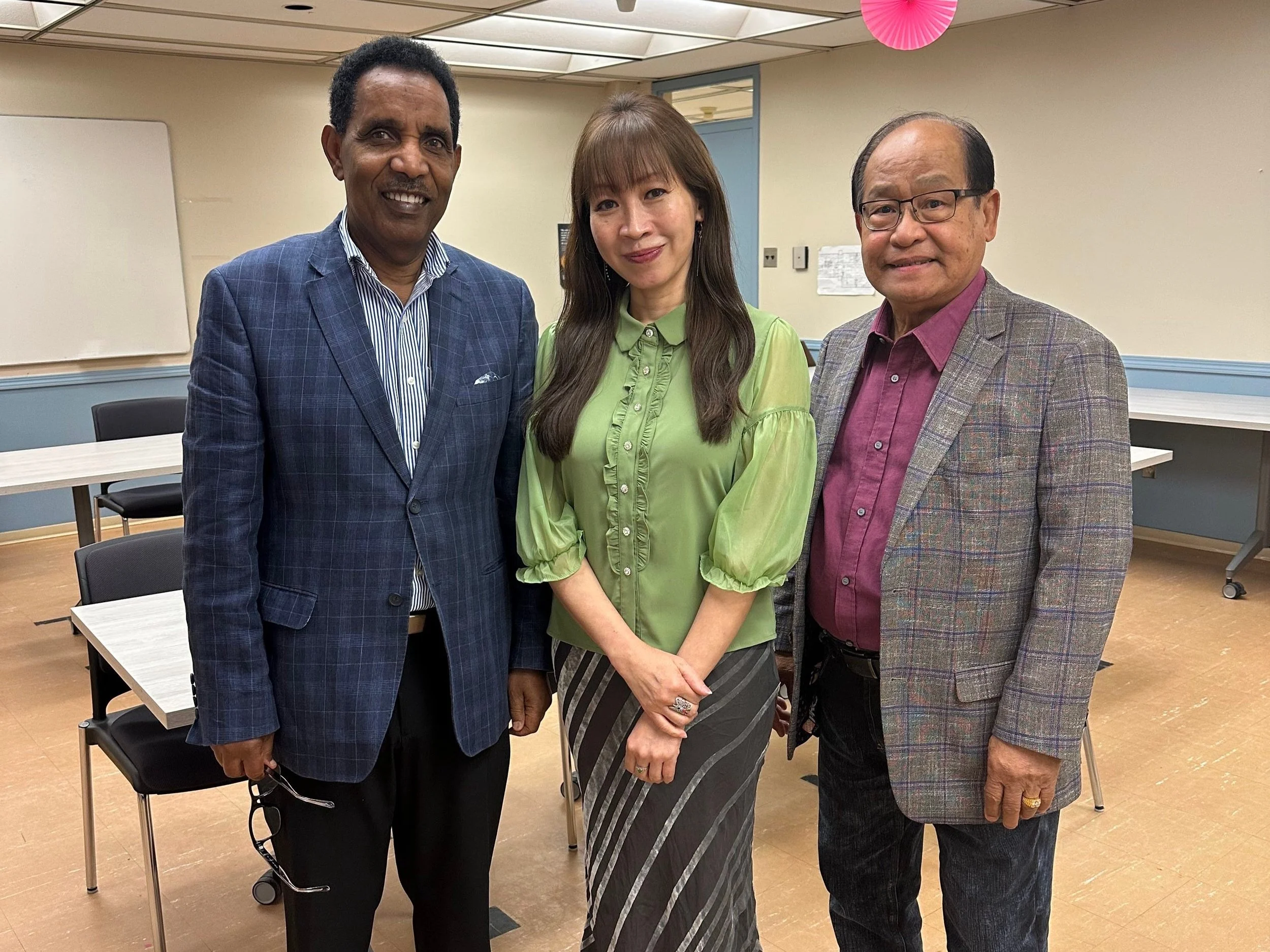25 Years of Cultural Connection
Manitoba Possible’s Cultural Resource Facilitators reflect on helping newcomers with disabilities navigate life in Canada and how their work has reshaped support.
They’re sitting just down the hall from the small cubicle where it all began with one desk, shared by the team, piled with paperwork. “Not even a computer,” they laugh.
Flaviano, Tiffany, and Ghebre have all worked as Cultural Resource Facilitators with Manitoba Possible’s Newcomer Navigation and Support for 25 years. As they swap stories about the early days of their career, the conversation naturally drifts to culture. They talk about the nuances that shape communication in each of their cultures—how meaning and understanding can look different depending on where someone is from. These are insights make the difference between a newcomer to Canada feeling lost, or feeling understood.
From left: Ghebre, Tiffany and Flaviano at Manitoba Possible’s 825 Sherbrook Street offices.
Laying the Groundwork
The program began in 1996, originally known as the Ethno-Cultural Program, as the result of a research study carried out in partnership with Manitoba Possible (then Society for Manitobans with Disabilities) and organizations part of our Self-Help Clearinghouse.
All three—Flaviano from Phillipines, Tiffany from China, and Ghebre from Ethiopia—were recruited for their ability to bridge cultures and build trust within their own communities. As Cultural Resource Facilitators, they help newcomers with disabilities, in their first language, to navigate unfamiliar systems - from healthcare to education to social services. The program is the only of its kind in Canada.
Back then, the work was new. They hosted picnics, attended cultural festivals and met with community leaders. And, while promoting the program to new clients, they gave presentations to school divisions, law enforcement, and healthcare staff, helping service providers understand culturally appropriate care.
The role of a cultural resource facilitator was often misunderstood.
“Lots of people assumed we were language interpreters,” recalls Tiffany. “It’s not wordfor-word translation. I remember in a meeting with a teacher, they asked one short question, I added four or five sentences to explain what the meaning is to mom, and then listened to mom ask questions and share her experiences. The teacher was looking confused. But I’m there to make sure that mom understands what they’re asking her and why they’re asking it.”
Introducing Disability in Canada
A big piece of their work continues to be helping newcomers relearn what it means to have a disability.
“Back home, people with disabilities face stigma or shame,” explains Ghebre. “They're not keen on exposing themselves or seeking help until we explain that we are in Canada— they can seek support and help.”
Their work is also deeply personal and dependent on trust and relationships. Flaviano remembers meeting a client hours after their home burned down, helping the family secure immediate support. Tiffany recalls delivering life-altering news to a family whose child was born prematurely and supporting them through multiple surgeries and life stages since. But over time, there's an intentional shift.
“One of the objectives is that our clients, in the long run, once they’re fully oriented to the systems, they’ll be able to advocate for themselves,” explains Flaviano.
“Seeing that they’re successful, hearing those success stories, it makes me say to them, ‘I’m happy you are well,’” he adds. “The fewer calls you get, the happier you become.”
Cultural Resource Facilitators become trusted allies whose work has a lasting impact on the lives of the families they support.
“I was in line at the Tim Hortons drive through. The uncle of my client was in front of me. He started waving at me. He recognized me in my car,” laughs Flaviano.
“When a client calls and says, ‘Can I take you to Tim Hortons?’ that’s when you know you’ve done a good job,” says Ghebre.
The Power of Teamwork
What started around a small, shared desk has rippled outward. Their work has helped inspire a national effort called the National Cultural Brokers Project aimed at defining the role and strengthening the identity of cultural brokers across the country, helping bridge the gap between newcomers and the systems that support them.
“What keeps me doing this work for 25 years is how special and unique our team members are,” Tiffany says. “We all come from different cultures and backgrounds. We understand each other and we support each other. We’re a big family.”
After 25 years, their commitment hasn’t wavered— they’re still driven to help shape a more inclusive and accessible province, and country, for all.
Learn more about our Newcomer Navigation and Support.


